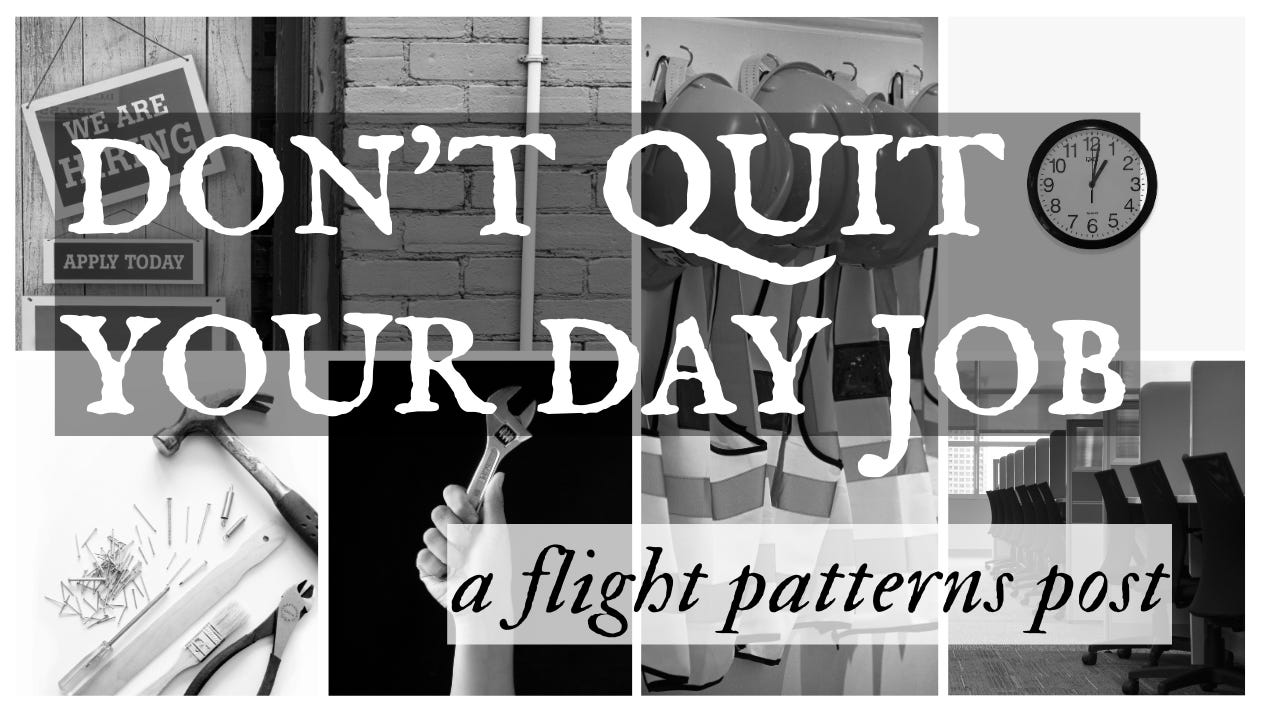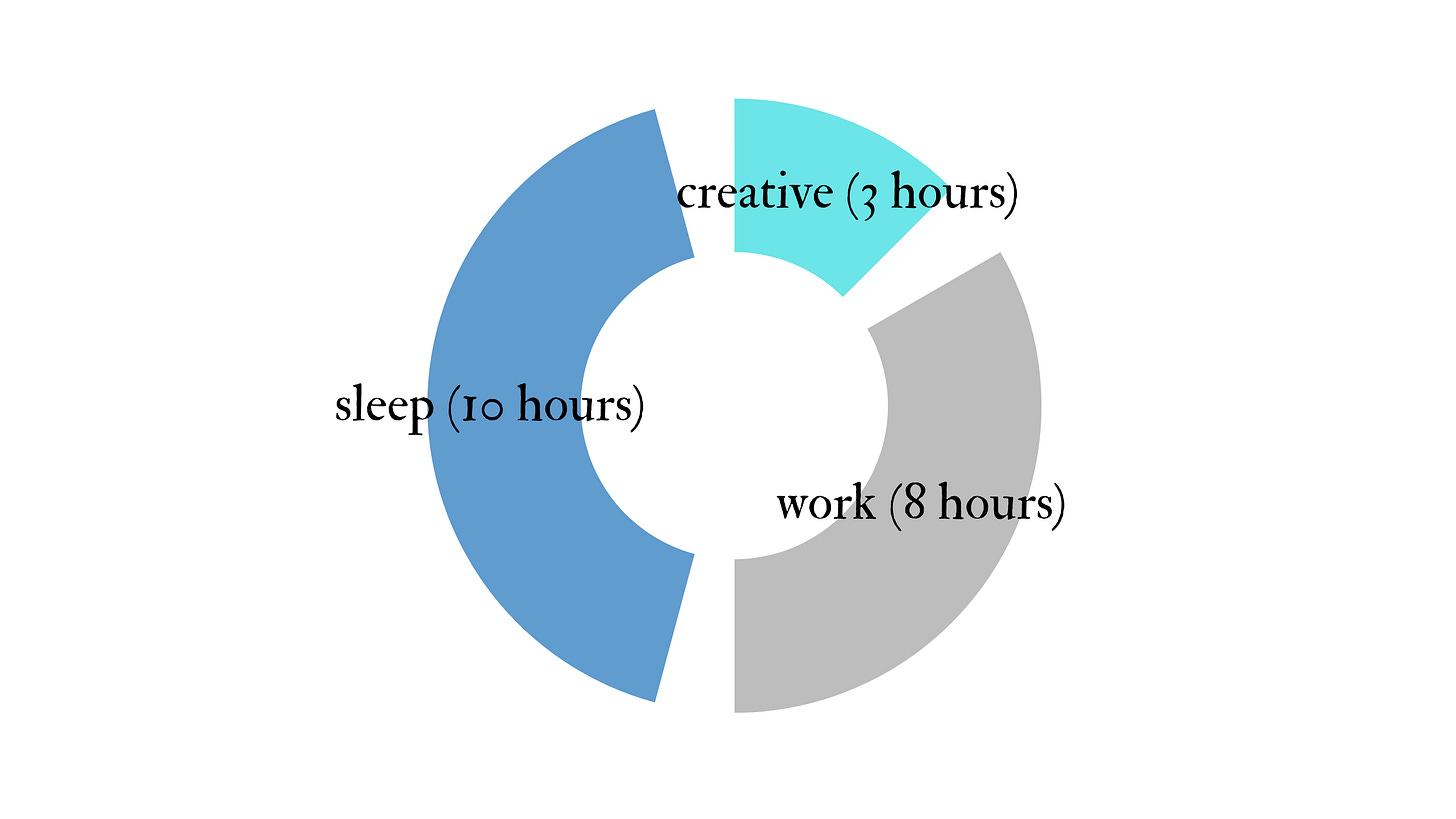I don’t know about you, but I used to have this concept that to truly have “made it” as an artist, your art needed to pay your bills. In my mind the “real artist” was the full-time artist. Oh, I knew it would take time, but I was getting a head start at 16 and was confident that I could make a living off of my art when I was an adult.
But as graduation and my 18th birthday approached, I still wasn’t making anything from my art and I started to doubt myself as an artist. When I started searching for a full-time job, it felt like admitting defeat. I had dreams, but they seemed out of reach. So I stopped reaching.
However, I read the title of an article by Julia Bartel (Portrait of an Artist Holding Down a Job) that started me thinking about potential benefits of intentionally not being a full time artist.
For context — I’ve been employed since 2021 and have worked for 4 different companies as well as housecleaning and the occasional freelance editing, graphic design, or writing gig. For the sake of this post, a day job or a traditional job are jobs where I don’t use my creative skills on a daily basis.
Benefits of working a day job
Way less pressure on the art side since money isn’t the measuring stick.
Relying on my art for a living led me to feelings of “not being good enough.” But knowing my bills are covered by a traditional paycheck means the money I make on my art can go to things I want. (Although I’m still a miser by habit.)
Keeps an artist grounded in reality.
I don’t know how important being grounded in reality is to you. But in a world of screens and fads, it can be hard to tell what’s real and what’s smoke in the wind. I have to be careful because I tend to develop dissociative or depressive symptoms. A traditional job requires me to get out of the house and helps me hold onto what is real.
Since I work late shifts, I’m privileged to see the night sky when I get home, and being able to observe the cycle of the moon grounds me in my existence and keeps me aware of the passage of time. The stars remind me of God's presence and constant care, even though in the grand scheme of things, I’m small and easily overlooked.
Allows for socialization.
It's common — but not healthy — for me to self isolate, which makes me irritable and socially anxious. My day job keeps me socially healthy by requiring me to interact with people I might not otherwise experience. Whether with my coworkers or with the people we serve, I’ve had many interactions — some good, some bad — that have grown me as a person.
Gives new material.
If I spent all my time creating, I would quickly run out of ideas.
In a literature class last year, we read a short story set in a nursing home published in the textbook. When the unsuspecting teacher said “I don't know how much time you've spent in nursing homes,” my friends and I started giggling knowingly.
Of course the teacher asked us what was so funny.
“She works in a nursing home,” my friend Tessa explained, pointing to me.
“So is this story accurate?” the teacher asked me.
“Spot on.” I nodded.Several of the writers in that textbook were able to pen deep, compelling stories using details and experiences from work that wasn’t particularly creative. My work experience gives me plenty of things to write about, as well as opens my eyes to other perspectives.
Makes time more precious and structured.
There’s a tongue-in-cheek “law,” Parkinson’s Law, that says “a task will expand to fill the time available for its completion.”
For example, if I have all day to work, I’m less productive than if I know I only have three hours. I procrastinate less knowing I can’t “do it later.” If I only have three hours, I’ll have the right amount of pressure to get the work done.
This donut chart shows how I spend most of my days.Less drain on my creative well.
I can only write until it’s time for me to leave for work. When I’m restricted to one finite time slot for creating, I'm less at risk for creative burnout. My brain gets a break from what I’m working on and can come back refreshed.
For artists, working a day job can alleviate unnecessary financial strain and self-induced pressure and let them find more enjoyment in their art. Since working a traditional job, I’ve actually been freed up to pursue my dreams and experience more fulfillment in my art.




